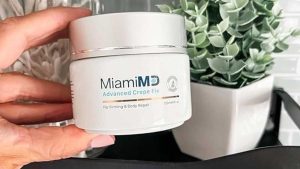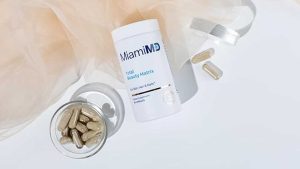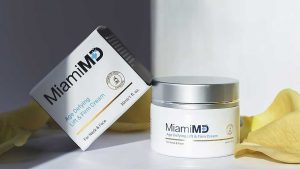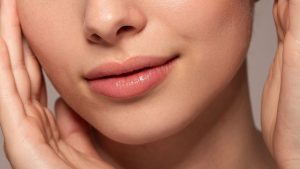9 Key Anti-Aging Ingredients | MiamiMD

Aging is something that happens to everyone, but with the right ingredients, you can keep your skin looking young and fresh. Today, we’ll explore the best anti-aging ingredients to help your skin stay smooth and glowing.
What Are the Best Ingredients for Youthful-Looking Skin?
Here are nine powerful ingredients that can help you fight the signs of aging:
1. Resveratrol
Resveratrol is a powerful antioxidant found in the skin of grapes and berries. It helps protect your skin from harmful environmental stressors, such as pollution and sun exposure, which can accelerate the aging process.
Studies have shown that resveratrol can prevent photoaging which occurs when your skin is damaged by UV rays (1). Additionally, it may even improve acne by easing irritation and promoting healing.
Resveratrol “increases collagen productionand decreases reactive oxygen species, which improve elasticity and make the skin thicker and more homogeneous, repairing scars and marks,” explains New York Dermatology Group Dermatologist Jaimie Glick (2).
2. Hyaluronic Acid
Hyaluronic acid is a natural substance found in your skin that plays a key role in keeping it hydrated. It has the unique ability to attract and hold onto moisture, helping your skin stay plump, smooth, and nourished.
“It attracts and binds with water to increase hydration, resulting in the feeling and appearance of plumper, fuller, smoother skin,” says dermatologist Michael Fong, M.D. (3). This extra hydration can help reduce the appearance of fine lines and wrinkles, giving your skin a more youthful, dewy glow.
As we age, our skin’s natural production of hyaluronic acid decreases, so using products with this ingredient can replenish moisture and promote a healthier, more radiant complexion.
3. Vitamin C
Vitamin C is a powerful antioxidant that works wonders for brightening your complexion. “I look at vitamin C as that little black dress in your closet,” says esthetician, Samantha Mims (4). “It’s definitely one of those things you must have. It works to boost circulation, amplify the skin’s complexion, and stimulate collagen production.” It helps to even out the look of your skin tone by reducing the appearance of dark spots, sun damage, and discoloration.
By supporting collagen production, vitamin C also helps improve skin elasticity, making it firmer and more resilient. This can result in a smoother, more youthful-looking appearance. Additionally, vitamin C’s antioxidant properties protect your skin from free radical damage, which can accelerate the aging process. Regular use of vitamin C can help your skin stay vibrant and glowing, with a more even tone and reduced signs of aging.
4. Progeline
Progeline is a peptide that targets the signs of aging by helping to tighten and firm the look of your skin. As we age, the production of collagen and elastin decreases, leading to sagging and loss of skin firmness.
Progeline works by strengthening the skin’s structure, which can reduce the appearance of sagging and help restore a lifted more youthful look. It also promotes the production of key proteins in the skin, improving overall texture and elasticity.
With regular use, Progeline can help your skin look firmer, smoother, and more rejuvenated — giving you a more lifted and youthful appearance.
5. Retinol
Retinol, a vitamin A derivative, is one of the most widely used and effective anti-aging ingredients available. It works by supporting healthy skin cell turnover, helping you shed old, dead skin cells, and promoting the growth of new, healthier cells. This process can reduce the appearance of wrinkles, fine lines, and dark spots, leading to smoother and more even-toned skin.
Retinol also supports collagen production, which helps firm and plump the skin, making it look more youthful and resilient. With consistent use, retinoids like retinol can significantly improve the overall texture and appearance of your skin — making it one of the most powerful tools in any anti-aging skincare routine.
“Retinol can enhance collagen production to prevent the formation of future lines and wrinkles. Combined with a high SPF and vitamin C in the morning, you are setting yourself up for great skin for life,” says Medik8’s Daniel Isaacs (5).
6. Peptides
Peptides are small chains of amino acids, the building blocks of proteins, that play a crucial role in skin health.
By supporting the proper production of collagen, peptides help maintain the skin’s structure and strength. Collagen is essential for keeping the skin firm, smooth, and elastic, which is why peptides are so effective in reducing the appearance of wrinkles and fine lines.
As we age, collagen production naturally slows down, leading to sagging and more visible signs of aging. “Peptides are good for people who are interested in decreasing fine lines and wrinkles, decreasing inflammation, and making the skin look firmer,” says Dr. Downie, M.D. (6). Adding peptides to your skincare routine can support collagen levels, supporting your skin’s texture and elasticity and giving you a smoother, more youthful-looking complexion.
7. Ceramides
“Ceramides are lipids found in the skin, and they are critical to a healthy barrier,” says dermatologist Dr. Geeta Yadav (7). This barrier is responsible for locking in moisture and protecting your skin from harmful irritants like pollution, harsh weather, and bacteria.
As we age, the production of ceramides in our skin decreases, leading to a weakened barrier and an increase in dryness and sensitivity. By adding ceramides to your skincare routine, you can restore your skin’s barrier, helping it retain moisture and stay hydrated.
A well-moisturized, protected skin barrier not only prevents dryness but also helps your skin look smoother, healthier, and more resilient.
8. Kojic Acid
Kojic acid is a natural skin-brightening ingredient derived from fungi and certain plants. It works by interacting with the production of melanin, the pigment responsible for dark spots and uneven skin tone. This makes it an excellent choice for reducing the look of hyperpigmentation, age spots, and sun damage.
Kojic acid helps to lighten and fade the look of dark spots, giving your skin a more even, radiant appearance. It’s particularly effective for those with discoloration caused by sun exposure or aging, as it gently works to restore a brighter and more youthful complexion.
Regular use of kojic acid can result in clearer, more uniform skin that looks refreshed and rejuvenated. “Even with somewhat limited research conducted on kojic acid, this skincare ingredient has already yielded impressive results in terms of skin brightening, lightening, and reducing hyperpigmentation,” says board-certified dermatologist Dr. Michelle Henry, M.D.(8).
9. Glycolic Acid
Glycolic acid, an alpha-hydroxy acid (AHA), is a gentle yet effective exfoliant that helps remove the buildup of dead skin cells from the surface of your skin. By doing so, it reveals fresh, smoother, and more youthful skin underneath. This exfoliation process also helps reduce the appearance of fine lines and uneven texture.
A 2020 study found that glycolic acid supports hyaluronic acid levels to maintain skin hydration and helps support collagen production, which improves skin firmness (9). It accelerates skin repair by encouraging cell turnover, helping your skin renew itself faster.
Additionally, glycolic acid enhances the quality of elastin, making your skin more bouncy, elastic, and resilient — resulting in a vibrant, youthful complexion.
How Else Can You Support Healthy Skin?
While using the right ingredients is important, there are other things you can do to keep your skin looking great:
Stay Hydrated
Drinking plenty of water is essential for maintaining skin hydration and overall health. Staying hydrated helps your skin retain moisture, preventing dryness and flakiness. When you drink enough water, it supports your skin’s appearance by keeping it soft and smooth, and it also helps flush out toxins, promoting a clearer, more radiant complexion.
Proper hydration improves skin elasticity and can even reduce the appearance of fine lines, giving you a fresh, youthful glow. So, make sure to drink water throughout the day to keep your skin looking its best.
Wear Sunscreen
Sun damage is one of the leading causes of premature aging — leading to wrinkles, fine lines, and dark spots. UV rays can penetrate your skin even on cloudy or overcast days, so it’s important to wear sunscreen daily. Sunscreen creates a protective barrier that helps shield your skin from harmful UVA and UVB rays, which can cause long-term damage.
By incorporating sunscreen into your skincare routine, you can prevent further aging and keep your skin looking youthful and healthy for years to come. Make it a habit to apply sunscreen every day, regardless of the weather.
The Bottom Line
Using the right anti-aging ingredients can make a big difference in how your skin looks and feels. Ingredients like resveratrol, hyaluronic acid, and vitamin C help combat wrinkles, boost hydration, and brighten your complexion, keeping your skin youthful and glowing.
However, achieving the best results goes beyond just skincare products — staying hydrated and protecting your skin with sunscreen daily are essential steps to prevent further damage. By combining these practices, you can maintain healthy, radiant skin and reduce the signs of aging for years to come.
Sources:
- Resveratrol as a factor preventing skin aging and affecting its regeneration | PMC (nih.gov)
- Can A Compound Found In Red Wine Help Your Skin? The Truth About Resveratrol | British Vogue
- Is hyaluronic acid a ‘wonder’ ingredient? A dermatologist explains | PeaceHealth
- 16 Best Vitamin C Serums of 2024, According to Dermatologists and Vogue Editors | Vogue
- What is retinol? Our guide to the must-have skincare ingredient | Cosmopolitan
- Peptides for Skin: Benefits and What They Do | Good Housekeeping
- What Are Ceramides? All About This Skin-Soothing Ingredient | Chatelaine
- The 8 Best Kojic Acid Skincare Products in 2024 – Kojic Acid Uses | Women’s Health
- Glycolic acid adjusted to pH 4 stimulates collagen production and epidermal renewal without affecting levels of proinflammatory TNF‐alpha in human skin explants – Narda – 2021 – Journal of Cosmetic Dermatology | Wiley Online Library





